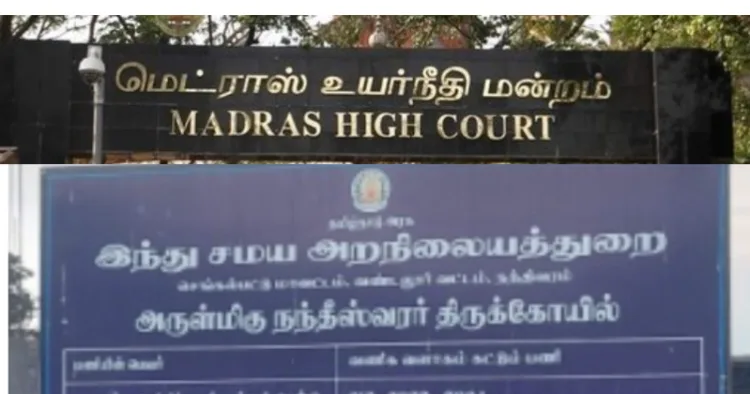The Madras High Court’s First Division Bench has quashed the tender proceedings for the construction of a commercial complex using the funds and properties of Sri Nandeeswarar Temple in Nadindivaram, Chengalpet district.
The bench, comprising the Chief Justice, heard arguments from counsel for the petitioner, B. Jagannath, who told Organiser that he had submitted that the HR and CE Act deals with charitable purposes only and specifies that temple funds and lands should not be used for further revenue generation through surplus funds.
He stated: “The Honourable First Bench posed a question as to whether there is any specific provision that allows for the construction of shopping complexes or similar commercial activities. In response, the Learned Special Government Pleader (SGP) submitted that the Commissioner has the power to approve such activities if it is deemed to be in the best interest of the temple and the propagation of Hindu religion.”
Temple devotee P. Baskar had filed a PIL challenging the tender and the proposed construction, arguing that it violated the Tamil Nadu Hindu Religious and Charitable Endowments (HR and CE) Act, 1959.
Jagannath, counsel for the petitioner, said: “A Writ of Certiorari was filed to call for the records made by the 4th Respondent, namely the Executive Officer of Arulmighu Nandeeswarar Thirukoil, Vandalur, vide Impugned Order made in DIPR/6587/Tender/2023, dated 11.12.2023, as per tender notification No. 1, published in The New Indian Express. The petition sought to quash the same. Additionally, Contempt Petition 3306 of 2024, P. Baskar vs. Karthikeyan, Assistant Commissioner, HR and CE Department & Executive Officer, Arulmighu Nandeeswarar Thirukoil, Nandivaram Village, Vandalur Taluk, Chengalpet District, was also filed.”
In its order, the bench stated: “The prayer sought to punish the Respondents for wilful disobedience of the Interim Order passed by this Honourable Court on 24.09.2024 in WMP 29041 of 2024 in WP 19084 of 2024. The interim order restrained the Respondents from proceeding with the construction of the shopping complex.”
Both matters were tagged together on 07.11.2024, and the interim stay granted on 24.09.2024 was extended until further orders. Both cases were heard together. A counter affidavit in both the main matter and the contempt petition was filed by the Respondents, along with the rejoinder/reply to the counter affidavit by the petitioner. Pleadings were completed, and the matter was posted for a hearing on 09.01.2025.
Advocate Jagannath said: “When the matter was taken up for hearing, the Special Government Pleader (SGP) for HR and CE submitted that recommendations and confirmations for three out of five trustees had been sent to the Government for approval for the said temple. Furthermore, it was stated that there would be no alcohol, meat, or cigarette/tobacco stalls, and the shopping complex would cater exclusively to the sale of pooja items or utensils for temple-related purposes. Upon the appointment of trustees, a trust board resolution would be passed regarding the shopping complex, and the matter would be decided accordingly.
“Per contra, I strongly opposed this and submitted that the issue in question was not limited to the non-appointment of trustees. While this was one of the main contentions of the petitioner, the crucial legal issue was whether a shopping complex could be constructed on temple land with temple funds, particularly when the Act and legislation are silent on this aspect. This was the primary issue to be decided in the writ petition. The First Division Bench posed a question to the petitioner’s counsel pertaining to the provisions of the Act being relied upon.”
After hearing detailed arguments from the counsel for both parties, the Learned First Division Bench passed the following directions:
A. A plain reading of the relevant provisions of the HR and CE Act, specifically Sections 36(1), 36(A), 36(B), and 66(1), makes it clear that the Act does not envisage or specifically provide for the construction of any shopping complex. The surplus funds of a religious institution can only be used for the purposes mentioned in the Act and not for revenue generation, even if it benefits the temple.
B. Instead of constructing a shopping complex, the respondents could have deposited the amount in a fixed deposit, which would yield a return of 7.5%. It was noted that no feasibility study or report was undertaken by the HR and CE Department regarding the return on investment. Even with a 6.5% return and tax rebates, a fixed deposit would be a better option for generating revenue than constructing a shopping complex to lease out in Chengalpet district.
C. The impugned order is, therefore, quashed. It is clarified that the superstructure shall be utilised as per the Act, specifically under Section 36(A) for free marriages for poor Hindus or Section 36(B) for the construction of an annadhanam (free food distribution) shed. The court closed all other connected MPs.
Very Good News!
A big relief in protecting Temple money in Tamil Nadu ! A blow to @tnhrcedept indulging in illegal constructions with temple funds and properties!
Advocate B Jagannath of Madras High Court – appearing for temple devotee P. Baskar – challenged the… pic.twitter.com/AWyNfKadpr
— trramesh (@trramesh) January 10, 2025
Temple activist T.R. Ramesh reacted on Twitter: “A big relief in protecting temple money in Tamil Nadu! A blow to @tnhrcedept indulging in illegal constructions with temple funds and properties! … A big blow for @tnhrcedept, which was depleting thousands of crores of temple funds by awarding ‘contracts’ for illegal constructions.”



















Comments